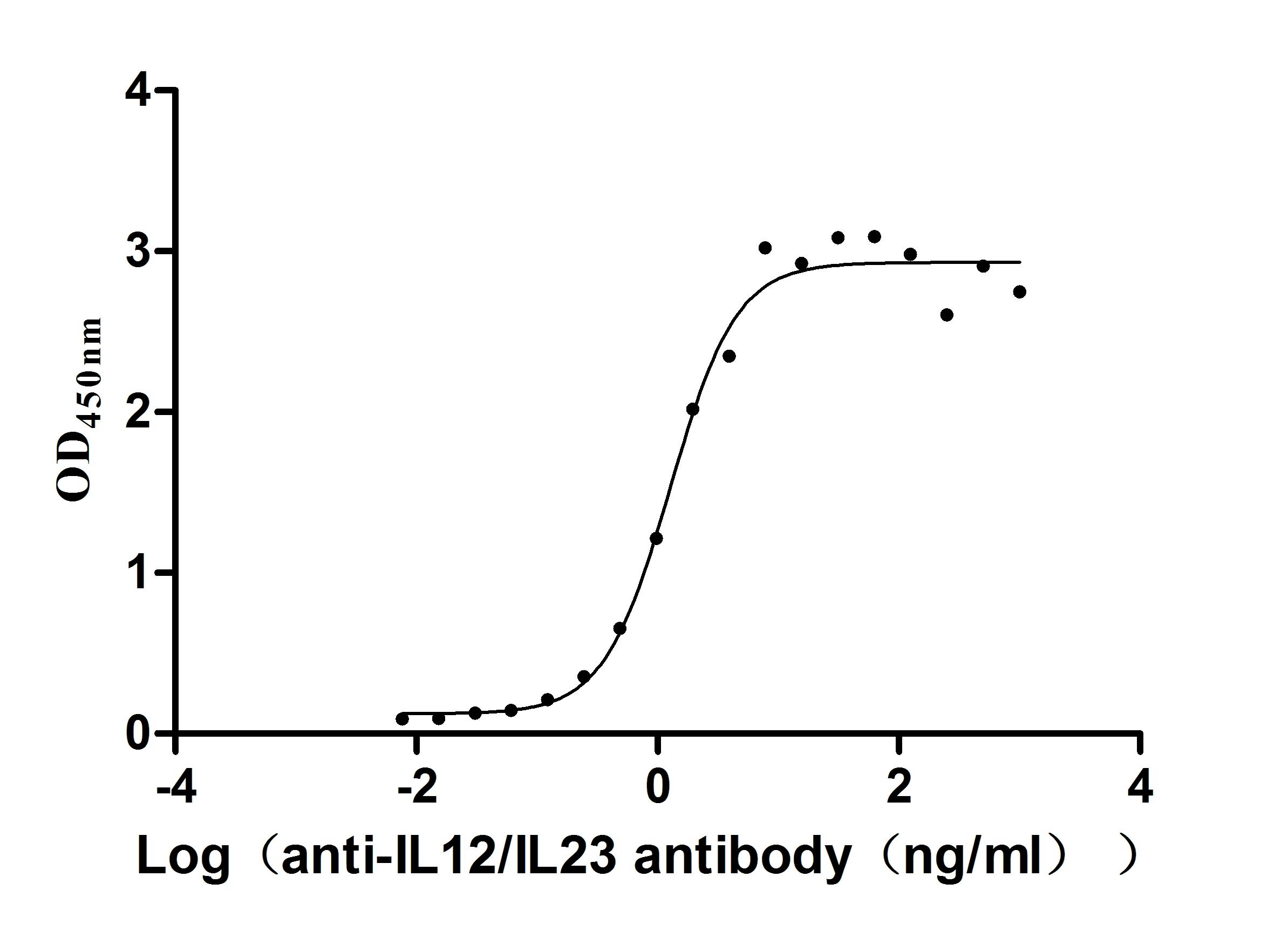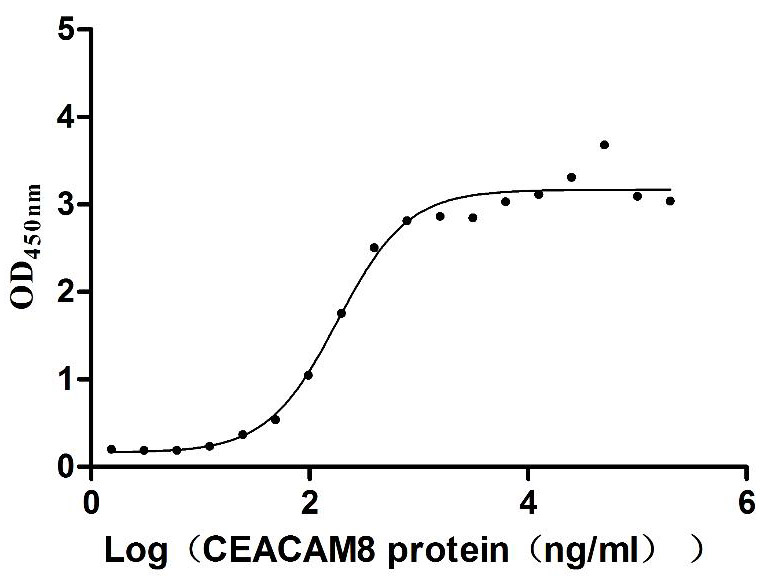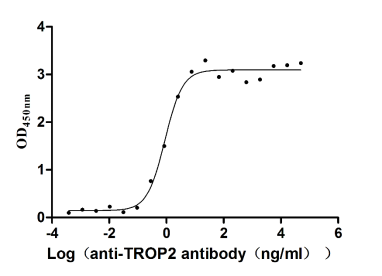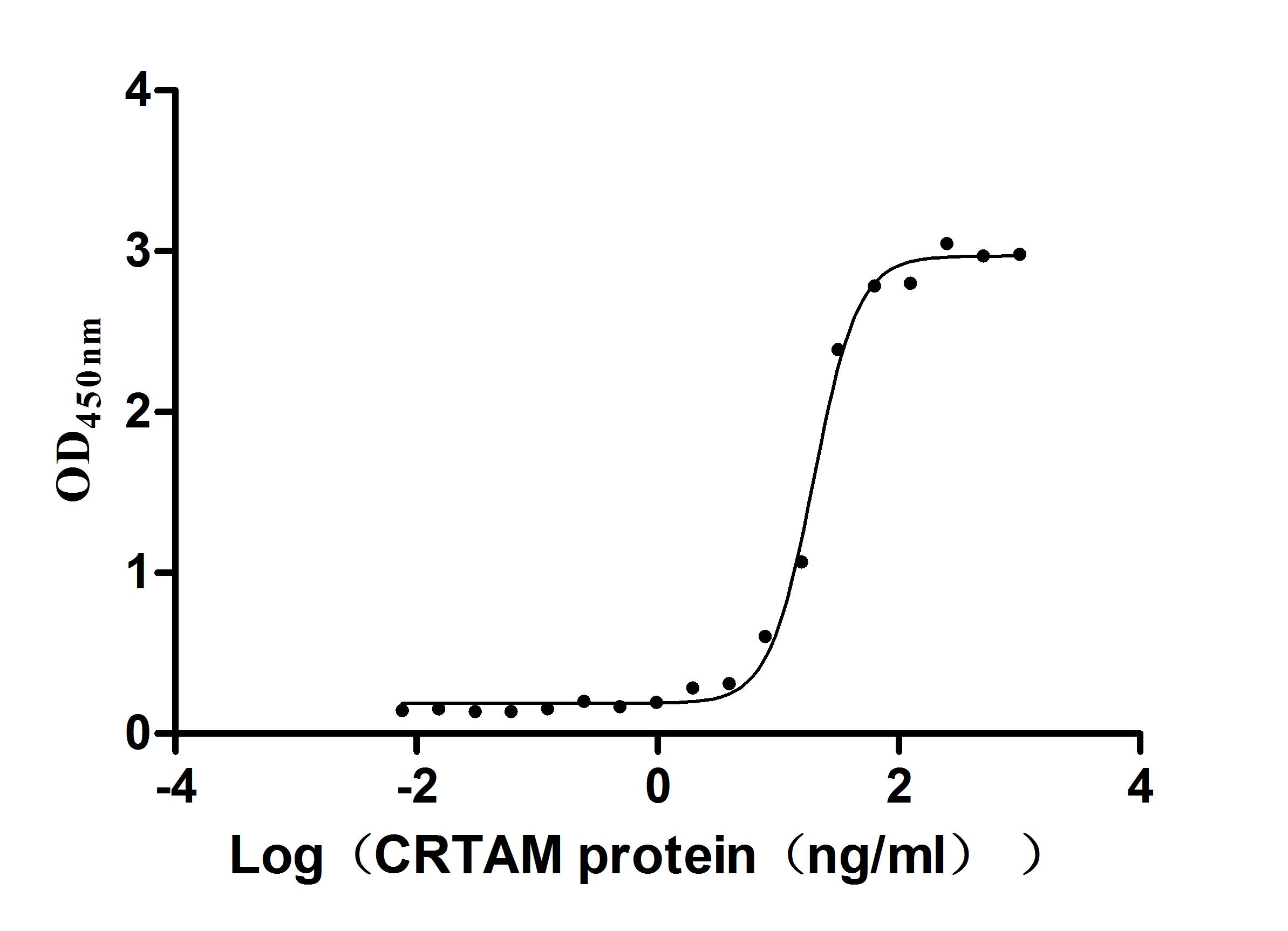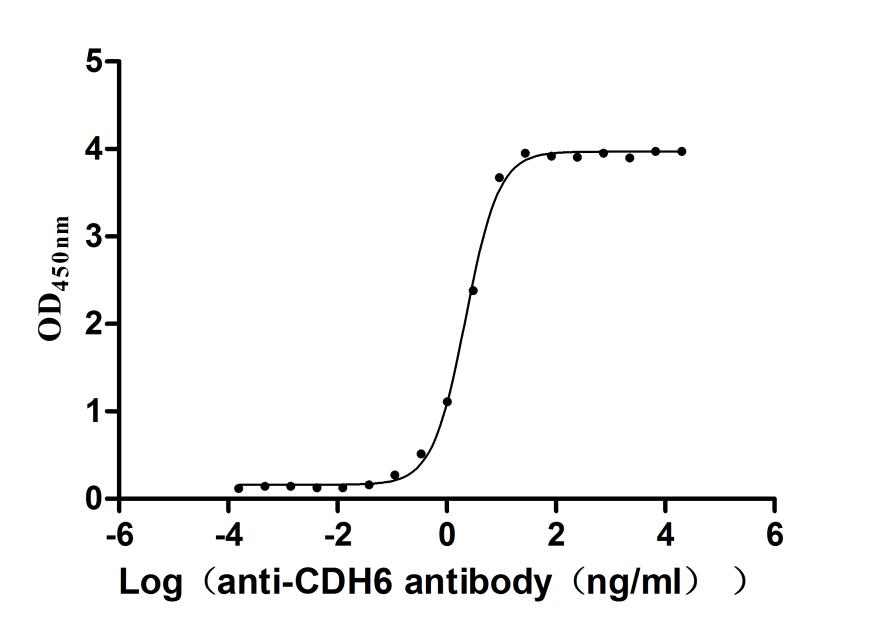Recombinant Human Cannabinoid receptor 1 (CNR1), partial
-
货号:CSB-YP005678HU1
-
规格:
-
来源:Yeast
-
其他:
-
货号:CSB-EP005678HU1
-
规格:
-
来源:E.coli
-
其他:
-
货号:CSB-EP005678HU1-B
-
规格:
-
来源:E.coli
-
共轭:Avi-tag Biotinylated
E. coli biotin ligase (BirA) is highly specific in covalently attaching biotin to the 15 amino acid AviTag peptide. This recombinant protein was biotinylated in vivo by AviTag-BirA technology, which method is BriA catalyzes amide linkage between the biotin and the specific lysine of the AviTag.
-
其他:
-
货号:CSB-BP005678HU1
-
规格:
-
来源:Baculovirus
-
其他:
-
货号:CSB-MP005678HU1
-
规格:
-
来源:Mammalian cell
-
其他:
产品详情
-
纯度:>85% (SDS-PAGE)
-
基因名:
-
Uniprot No.:
-
别名:CNR1; CNR; Cannabinoid receptor 1; CB-R; CB1; CANN6
-
种属:Homo sapiens (Human)
-
蛋白长度:Partial
-
蛋白标签:Tag type will be determined during the manufacturing process.
The tag type will be determined during production process. If you have specified tag type, please tell us and we will develop the specified tag preferentially. -
产品提供形式:Lyophilized powder
Note: We will preferentially ship the format that we have in stock, however, if you have any special requirement for the format, please remark your requirement when placing the order, we will prepare according to your demand. -
复溶:We recommend that this vial be briefly centrifuged prior to opening to bring the contents to the bottom. Please reconstitute protein in deionized sterile water to a concentration of 0.1-1.0 mg/mL.We recommend to add 5-50% of glycerol (final concentration) and aliquot for long-term storage at -20℃/-80℃. Our default final concentration of glycerol is 50%. Customers could use it as reference.
-
储存条件:Store at -20°C/-80°C upon receipt, aliquoting is necessary for mutiple use. Avoid repeated freeze-thaw cycles.
-
保质期:The shelf life is related to many factors, storage state, buffer ingredients, storage temperature and the stability of the protein itself.
Generally, the shelf life of liquid form is 6 months at -20°C/-80°C. The shelf life of lyophilized form is 12 months at -20°C/-80°C. -
货期:Delivery time may differ from different purchasing way or location, please kindly consult your local distributors for specific delivery time.Note: All of our proteins are default shipped with normal blue ice packs, if you request to ship with dry ice, please communicate with us in advance and extra fees will be charged.
-
注意事项:Repeated freezing and thawing is not recommended. Store working aliquots at 4°C for up to one week.
-
Datasheet :Please contact us to get it.
相关产品
靶点详情
-
功能:G-protein coupled receptor for endogenous cannabinoids (eCBs), including N-arachidonoylethanolamide (also called anandamide or AEA) and 2-arachidonoylglycerol (2-AG), as well as phytocannabinoids, such as delta(9)-tetrahydrocannabinol (THC). Mediates many cannabinoid-induced effects, acting, among others, on food intake, memory loss, gastrointestinal motility, catalepsy, ambulatory activity, anxiety, chronic pain. Signaling typically involves reduction in cyclic AMP. In the hypothalamus, may have a dual effect on mitochondrial respiration depending upon the agonist dose and possibly upon the cell type. Increases respiration at low doses, while decreases respiration at high doses. At high doses, CNR1 signal transduction involves G-protein alpha-i protein activation and subsequent inhibition of mitochondrial soluble adenylate cyclase, decrease in cyclic AMP concentration, inhibition of protein kinase A (PKA)-dependent phosphorylation of specific subunits of the mitochondrial electron transport system, including NDUFS2. In the hypothalamus, inhibits leptin-induced reactive oxygen species (ROS) formation and mediates cannabinoid-induced increase in SREBF1 and FASN gene expression. In response to cannabinoids, drives the release of orexigenic beta-endorphin, but not that of melanocyte-stimulating hormone alpha/alpha-MSH, from hypothalamic POMC neurons, hence promoting food intake. In the hippocampus, regulates cellular respiration and energy production in response to cannabinoids. Involved in cannabinoid-dependent depolarization-induced suppression of inhibition (DSI), a process in which depolarization of CA1 postsynaptic pyramidal neurons mobilizes eCBs, which retrogradely activate presynaptic CB1 receptors, transiently decreasing GABAergic inhibitory neurotransmission. Also reduces excitatory synaptic transmission. In superior cervical ganglions and cerebral vascular smooth muscle cells, inhibits voltage-gated Ca(2+) channels in a constitutive, as well as agonist-dependent manner. In cerebral vascular smooth muscle cells, cannabinoid-induced inhibition of voltage-gated Ca(2+) channels leads to vasodilation and decreased vascular tone. Induces leptin production in adipocytes and reduces LRP2-mediated leptin clearance in the kidney, hence participating in hyperleptinemia. In adipose tissue, CNR1 signaling leads to increased expression of SREBF1, ACACA and FASN genes. In the liver, activation by endocannabinoids leads to increased de novo lipogenesis and reduced fatty acid catabolism, associated with increased expression of SREBF1/SREBP-1, GCK, ACACA, ACACB and FASN genes. May also affect de novo cholesterol synthesis and HDL-cholesteryl ether uptake. Peripherally modulates energy metabolism. In high carbohydrate diet-induced obesity, may decrease the expression of mitochondrial dihydrolipoyl dehydrogenase/DLD in striated muscles, as well as that of selected glucose/ pyruvate metabolic enzymes, hence affecting energy expenditure through mitochondrial metabolism. In response to cannabinoid anandamide, elicits a proinflammatory response in macrophages, which involves NLRP3 inflammasome activation and IL1B and IL18 secretion. In macrophages infiltrating pancreatic islets, this process may participate in the progression of type-2 diabetes and associated loss of pancreatic beta-cells.; Binds both 2-AG and anandamide.; Only binds 2-AG with high affinity. Contrary to its effect on isoform 1, 2-AG behaves as an inverse agonist on isoform 2 in assays measuring GTP binding to membranes.; Only binds 2-AG with high affinity. Contrary to its effect on isoform 1, 2-AG behaves as an inverse agonist on isoform 3 in assays measuring GTP binding to membranes.
-
基因功能参考文献:
- The cannabinoid receptor 1 (CNR1) was identified as a direct target gene of miR1273g3pand knockdown of CNR1 restored the phenotypes of LoVo cells transfected with miR1273g3p inhibitor. PMID: 29328379
- The Arg82 and Cys126 of CRIP1b are involved in the majority of hydrogen bond interactions with the CB1 receptor and are possible key residues required for interactions between the CB1 receptor and CRIP1b PMID: 28918320
- The CB1 pathway is involved in the pathogenesis of shoulder stiffness. It may be a promising target for the treatment of rotator cuff lesions with shoulder stiffness. PMID: 29108858
- CB1 receptors are among the most abundant G protein-coupled receptors in the brain that impact on several processes, including fear coping, anxiety, stress, learning, and memory. (Review) PMID: 29058339
- CB1 receptor (CB1b) is highly expressed in pancreatic beta-cells and hepatocytes but not in the brain. PMID: 27641999
- All of the epithelial layers in 94, 78, 96, 73 and 80% of pterygia cases, exhibited CB1, CB2, TRPV1, TRPV2 and TRPV3 cytoplasmic immunoreactivity, respectively. PMID: 28849159
- observed selective alterations of DNA methylation at the promoter of CNR1, the gene coding for the type-1 cannabinoid receptor, in schizophrenic patients with no changes in bipolar or major depressive disorder. In an animal model prefrontal cortex found a significant increase in CNR1 expression and a consistent reduction in DNA methylation at specific CpG sites of gene promoter. PMID: 28108228
- This study of single-nucleotide polymorphisms in the cannabinoid receptor gene CNR1 showed that C carriers at rs806374 may be at specific risk for increased odds of cannabis use during the transition out of high school (around age 18). PMID: 28930056
- results suggest that palmitoylation of the CB1 receptor finely tunes its interaction with G proteins and serves as a targeting signal for its functional regulation PMID: 28722168
- we have associated cannabinoid 1 (CB1) receptor genetic variation rs2180619 (AA, AG, GG), which is located in a potential CNR1 regulatory sequence, with performance in working memory. no differences were found among genotypes while performing each working memory (WM) task. However, the cost of the level of complexity in N-back paradigm was double for GG subjects than for AA subjects. PMID: 27108777
- two agonist-bound crystal structures of human CB1 in complex with a tetrahydrocannabinol (AM11542) and a hexahydrocannabinol (AM841) at 2.80 A and 2.95 A resolution, respectively PMID: 28678776
- that a genetically modulated balancing of signaling within the CB1-COX-2 pathway may reflect on more or less efficient patterns of prefrontal activity during working memory PMID: 27261878
- In cotransfected HEK-293 cells, SSTR5 and CB1R existed in a constitutive heteromeric complex under basal condition, which was disrupted upon agonist treatments. Furthermore, concurrent receptor activation led to preferential formation of SSTR5 homodimer and dissociation of CB1R homodimer. PMID: 27984180
- CB1R availability was inversely associated with BMI in homeostatic brain regions such as the hypothalamus and brainstem areas in both patients with food intake disorders(FID) and healthy subjects. However, in FID patients, CB1R availability was also negatively correlated with BMI throughout the mesolimbic reward system. PMID: 27404285
- hepatic expression of CB1 and CB2 plays an important role during the progression of fibrosis induced by chronic hepatitis B PMID: 28315398
- propose here a possible unifying theory of CB1 receptor functions. PMID: 28334603
- Patients with schizophrenia showed increased CB1A expression in cells of the innate immune system and simpler correlation network between cytokines and CBRs expression when compared with controls. PMID: 28011441
- our systematic review on potential associations of CNR1 polymorphisms with schizophrenia and its subphenotypes revealed conflicting data, with results tending towards a negative association. PMID: 28099629
- Our study disclosed an increased risk of CVS among individuals with AG and GG genotypes of CNR1 rs806380 ( P <0.01), whereas the CC genotype of CNR1 rs806368 was associated with a decreased risk of CVS ( P <0.05). In addition CT and CC genotypes of CNR1 rs806368 were associated with a family history of migraines. PMID: 28349993
- U46619 and ANG II may stimulate rapid endothelial release of endocannabinoids (mainly 2-arachidonoylglycerol), leading to CB1 receptor-dependent and/or CB1 receptor-independent vasorelaxation, which in the negative feedback mechanism reduces later agonist-induced vasoconstriction. PMID: 28356298
- Data suggest that signaling via endocannabinoids and CNR1/CNR2 plays central role in food intake; the endocannabinoid system regulates bidirectional communication (in the context of energy intake and storage) between the brain and peripheral tissues (adipose tissue, liver, gastrointestinal tract, endocrine pancreas, and skeletal muscle). [REVIEW] PMID: 28246151
- Selective estrogen receptor (ER) modulator (SERM) isomers exhibit distinct affinity and selectivity for cannabinoid subtype 1 and 2 receptors (CB1R and CB2Rs). PMID: 27936172
- We investigated the relationship between variation in the CNR1, CNR2, and FAAH genes and change in primary anxiety disorder severity. Five SNPs were nominally associated with a poorer treatment response (rs806365 [CNR1]; rs2501431 [CNR2]; rs2070956 [CNR2]; rs7769940 [CNR1]; rs2209172 [FAAH]) and one with a more favorable response (rs6928813 [CNR1]). PMID: 27346075
- we investigated whether the effect of the CB1 receptor coding CNR1 gene on migraine and its symptoms is conditional on life stress. We covered the CNR1 gene with 11 SNPs. None of the SNPs showed main genetic effects on possible migraine or its symptoms. 5 SNPs showed nominally significant interaction with recent negative life events on headache with nausea PMID: 27762084
- major allele homozygotes in rs806379 experienced significantly greater nicotine deprivation-induced reductions in cognitive control as indicated by enhanced alpha-1 resting EEG power. Analysis of the 'TAG' haplotype on CNR1 predicts reduced mRNA expression in postmortem analyses of the brain. The rs806379 findings suggest that CNR1 antagonism may mitigate the influence of nicotine deprivation on cognitive disruption. PMID: 27453054
- These findings suggest that Gi1 interacts only with active GPCRs and that the well known high speed of GPCR signal transduction does not require preassembly between G proteins and GPCRs. PMID: 28438833
- the presence and differential distribution of fatty acid amide hydrolase (FAAH) and monoglyceride lipase (MGLL) in relation to CB1 during the maturation of human oocytes, was investigated. PMID: 26948343
- CRIP1a can compete with beta-arrestins for interaction with C-terminal CB1R domains that could affect agonist-driven, beta-arrestin-mediated internalization of the CB1R. PMID: 27895162
- These findings indicate that D2 antagonism, like D2 agonists, change agonist-mediated CB1 coupling and signaling. PMID: 27053685
- there was a significant reduction in CB1 receptor gene expression levels in cancer tissue compared to normal surrounding mucosa of patients with CRC, confirming that in cancer the "protective" action of the CB1 receptor is lost. PMID: 28245562
- This study demonstrated that CB1 receptor up regulation in Human Stroke. PMID: 27425766
- We hypothesize that high expression levels of CNR1 provide tumor susceptibility to the antitumor effects of circulating endocannabinoids like anandamide, resulting in tumor involution of pediatric low-grade gliomas PMID: 27613640
- evaluation of CB1R expression status in biopsy specimens of esophageal squamous cell carcinoma using immunohistochemistry might be clinically useful for prediction of metastasis to lymph nodes and distant organs PMID: 27976824
- Data indicate that mobile tongue squamous cell carcinoma (SCC) patients presenting enhanced cannabinoid receptors CB1R, CB2R, or concomitant CB1R/CB2R expression showed significantly longer overall and disease-free survival times compared to those with low expression. PMID: 26459312
- This is the first demonstration that the fibroblasts of the muscular fasciae express CB1 and CB2. PMID: 27349320
- Epistatic interaction between the 1359 G/A polymorphism of the CNR1 gene and the DRD2 gene polymorphisms may be associated with cannabis addiction phenotype in a Turkish population. PMID: 26833047
- in the group of all HD patients, a significantly higher incidence of GA genotype and lower incidence in GG genotype in the polymorphism rs806381s were revealed versus the control group (p = 0.04). It seems that polymorphisms of the CNR1 gene are not associated with uremic pruritus. PMID: 27034934
- Results suggest that CNR1 SNP genotype is associated with increased total cholesterol and Myocardial Infarction. PMID: 25270105
- this study presents the 2.8 A crystal structure of human CB1 in complex with AM6538, a stabilizing antagonist, synthesized and characterized for this structural study. PMID: 27768894
- The cannabinoid 1 receptor polymorphism rs1049353, is involved in the processing of negative facial expressions with relation to anger in adolescence. PMID: 26527537
- Novel finding of the present study is the association of the mutant groups of CNR1 genotypes with lower levels of triglycerides and higher levels of HDL-cholesterol than the wild-type group. PMID: 25682784
- The present study reports an association of the G1359A and A1359A CNR1 genotypes with lower levels of triglycerides and higher levels of HDL-cholesterol in obese females. PMID: 25664923
- In the adult human ependyma, which usually shows central canal absence, CB1 may play a different role by modulating astrocyte functions PMID: 26634814
- Induction of apoptosis was mediated via CB1 as well as CB2, and expression of CB receptors was a prerequisite for therapy response in our models. PMID: 26775260
- CNR1 polymorphisms are not associated with obesity and metabolic disorders, including insulin resistance, in PCOS women. PMID: 24971918
- data support an association between endocannabinoid system activity (cb1) and alcoholism. PMID: 26253623
- Human lung-resident macrophages express CB1 and CB2 receptors whose activation inhibits the release of angiogenic and lymphangiogenic factors PMID: 26467187
- Studies indicate that crosstalk between cannabinoid receptor type 1 (CB1) and transient receptor potential vanilloid 1 (TRPV1) modulates pain and inflammation in arthritis. PMID: 26343051
- The minor C allele of rs2023239 showed an independent protective effect against lifetime Manic Depressive Disorder. PMID: 26331953
- CNR1 polymorphism and child physical abuse GxE interaction predicts adult PTSD threat symptoms. PMID: 26717543
显示更多
收起更多
-
相关疾病:Obesity (OBESITY)
-
亚细胞定位:Cell membrane; Multi-pass membrane protein. Membrane raft. Mitochondrion outer membrane. Cell projection, axon. Cell junction, synapse, presynapse.
-
蛋白家族:G-protein coupled receptor 1 family
-
组织特异性:Widely expressed, with highest levels in fetal and adult brain. Expression levels of isoform 2 and isoform 3 are much lower than those of isoform 1.
-
数据库链接:
HGNC: 2159
OMIM: 114610
KEGG: hsa:1268
STRING: 9606.ENSP00000358511
UniGene: Hs.75110
Most popular with customers
-
Recombinant Human Tumor necrosis factor receptor superfamily member 8 (TNFRSF8), partial (Active)
Express system: Mammalian cell
Species: Homo sapiens (Human)
-
Recombinant Human Poliovirus receptor (PVR) (I340M), partial (Active)
Express system: Mammalian cell
Species: Homo sapiens (Human)
-
Recombinant Human HLA class II histocompatibility antigen gamma chain (CD74), partial (Active)
Express system: Mammalian cell
Species: Homo sapiens (Human)
-
Recombinant Human IL12B&IL12A Heterodimer Protein (Active)
Express system: Mammalian cell
Species: Homo sapiens (Human)
-
Recombinant Human Carcinoembryonic antigen-related cell adhesion molecule 6 (CEACAM6) (Active)
Express system: Mammalian cell
Species: Homo sapiens (Human)
-
Recombinant Human Tumor-associated calcium signal transducer 2 (TACSTD2), partial (Active)
Express system: Mammalian cell
Species: Homo sapiens (Human)
-
Recombinant Human Cell adhesion molecule 1 (CADM1), partial (Active)
Express system: Mammalian cell
Species: Homo sapiens (Human)
-
Recombinant Macaca fascicularis Cadherin 6(CDH6),partial (Active)
Express system: Mammalian cell
Species: Macaca fascicularis (Crab-eating macaque) (Cynomolgus monkey)


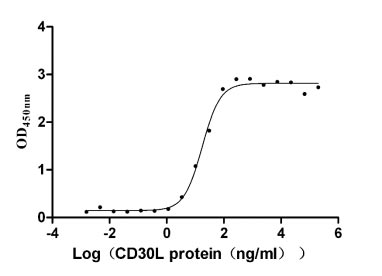
-AC1.jpg)
-AC1.jpg)
